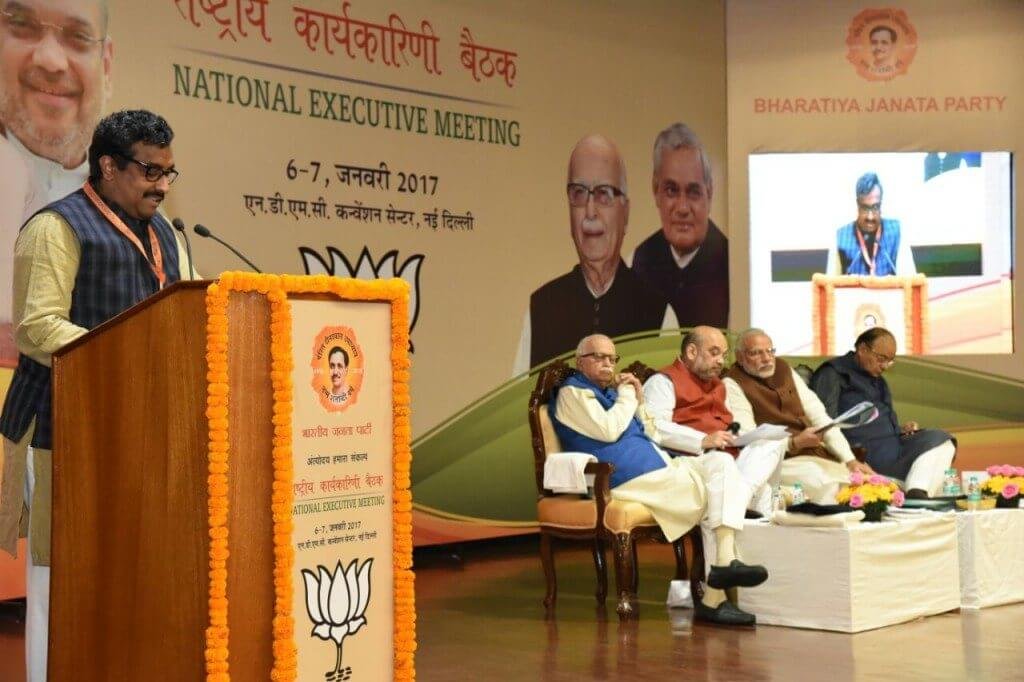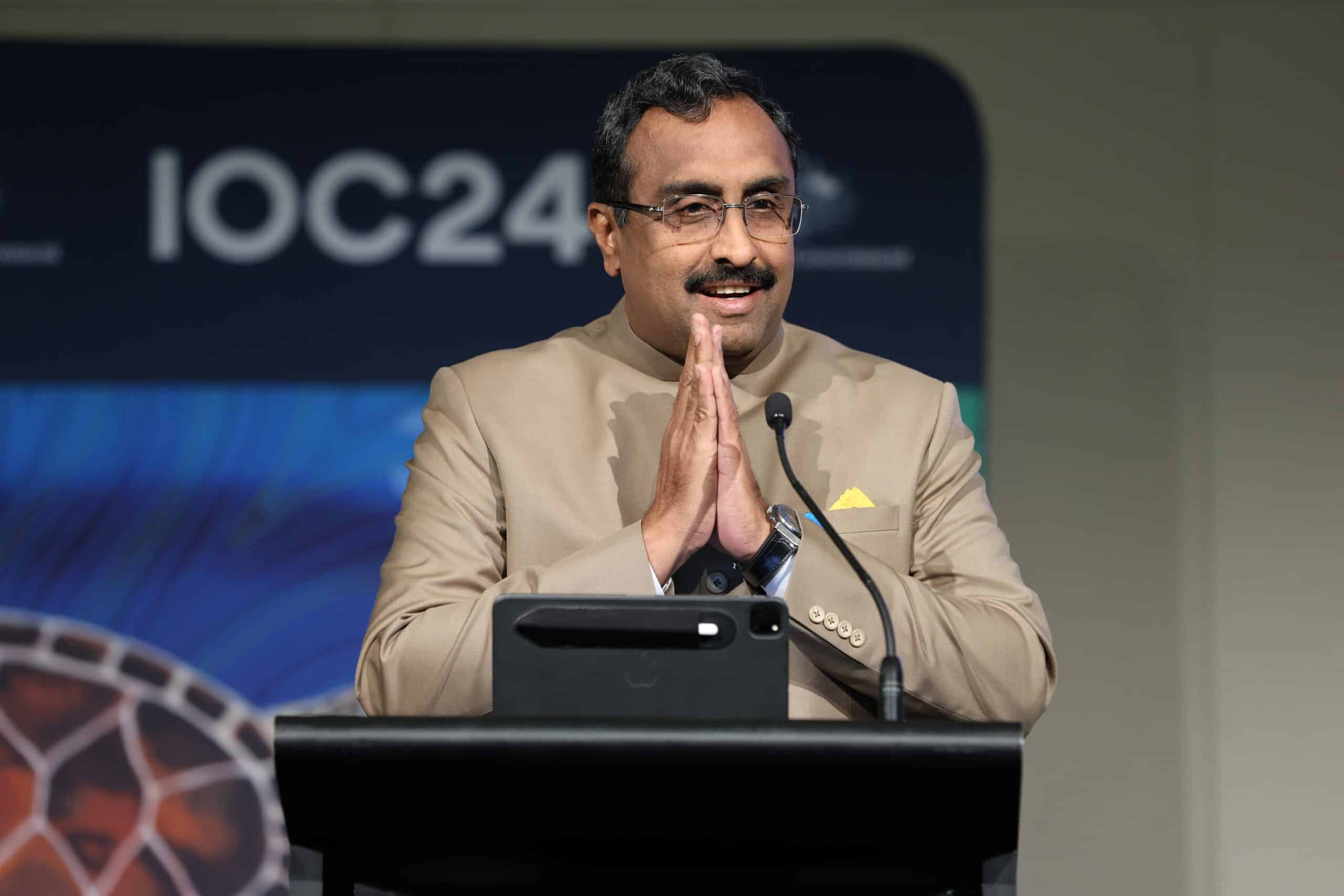|
Getting your Trinity Audio player ready...
|
(SOME MUSINGS FROM THE RECENTLY CONCLUDED BJP NATIONAL EXECUTIVE)
As members of the Sangh Parivar we have heard or sung a famous song which begins with the lines: पथ का अन्तिम लक्ष्य नहीं है सिंहासन चढ़ते जाना। It means ‘power is not the ultimate goal of our journey’.
In that song one stanza comes, which reads like this: छोटे-मोटे फल को पाने यह न परिश्रम सारा है! ‘All this hard work is not meant for some smaller gains’. We are not here merely for minor tinkering here and there. Then it goes on to say: सफल राष्ट्र का अनुपम वैभव सभी भांति से है लाना, meaning, we are here to bring about the ultimate glory of a successful nation in all respects.
In the political resolution passed recently at the National Executive of the BJP, we have talked about it. ‘We are here not merely for reform. Reform is good, but it is largely about tinkering the existing system. PM Modi’s vision is transformative. All the above mentioned schemes and programs are intended to bring about a fundamental course correction and transformation at the grassroots. A new culture of honesty, discipline, commitment and patriotism is the end goal of these measures by our government’, the resolution says. We are here on a completely transformative agenda.
In Mahabharat, at the end of the War, Yudhisthir, having become the king again, seeks to learn Raj Dharma from Bhishma, who was lying on the bed of arrows awaiting death. In that discourse on Raj Dharma one statement comes:
कालो वा कारणं राज्ञो राजा वा कालकारणम् ।
इति ते संशयो माभूत् राजा कालस्य कारणम् ॥
In the West, it is said that ‘a society gets a government it deserves’. But in Raj Dharma, Bhishma says ‘राजा कालस्य कारणम्’, meaning ‘it is the king, who is responsible for the times’. In our ancient wisdom it is said that the kings are not supposed to merely sail with the winds. They are supposed to hold the times by their horns and mend them.
Here lies the significance of our leadership today. We have a leader who believes in transforming the nation. In fact that is what scares the political opponents. A leader from Bengal has recently declared that her singular objective is to remove our leader from power. For her, it is no longer about note ban decision etc. It is about the leader himself. Because she and her ilk realise that here is a leader who is determined to change the political culture of the country.
And those fears are not unfounded. Our leadership has shown its commitment to transformative ideas. It is said that ‘a politician thinks about the next election, whereas a statesman thinks about the next generation’. Winning elections is not everything for a party although it is an important part of the political activity. Through various decisions in the last couple of years, our leadership has shown that our vision is not just election-centric but generational.
Raj Dharma discusses about the qualities of the kings who are transformative. Kings have to have साहस – courage; संवेदना – sensitivity and sympathy; समदृष्टि – equanimity. There is no need to talk specially about the courage of our leadership. The demonetisation decision is the latest example of the courage of our leadership to take toughest decisions without hesitation.
Recall what prime Minister had said in his first address from the Red Fort. Talking about women safety he asked a very pertinent question. ‘How many parents, that grill their daughters if they come home after 7 PM, ask their sons about their whereabouts when they come home late?’. It was a transformative question. It is not enough to have laws for women safety. Laws are important, but what is more important is to inculcate respect for women. That has to be taken care of by parents and society as well. We have a leader who has the courage to say that to the people.
This courage, coupled with sympathy for the poor and downtrodden is what is behind our leadership’s several transformative decisions in the last two years. Whether it is Jan Dhan Yojana for financial inclusion of the poor and marginalised or the welfare schemes for the handicapped whom we describe as Divyang or the Start Up and Stand Up schemes aimed at promoting entrepreneurship among the SCs, STs and women – the motivation is the spirit of ‘Antyodaya’.
Our transformative initiatives are courageous. No transformation is painless. That is why only the courageous can be transformative. Our leadership doesn’t talk about ‘poverty alleviation’ anymore. Alleviation means reducing the impact and intensity. We talk about total annihilation of poverty. We talk about shelter over the heads of every family by 2022. Similarly our leaders talk about complete eradication of corruption from our system.
But while doing all this we have to be balanced and impartial. A disciple asks Confucius a tricky question. Some say that if you are slapped, you should show the other cheek. Some say ‘for one tooth, the entire jaw’. Which approach is correct? Doing good to those who do bad to you? Or replying in same coin to those who harm you? Confucius puts a counter question to his disciple. If you do good to those who do bad to you, what do you do to those who do good to you? An then he answers the question of his disciple: Always do good to those who do good to you; To those who do bad to you, you don’t have to do bad unto them. Give them justice.
For giving justice one needs courage and character. Our leadership is not vengeful. Prime Minister’s Dec 30th speech is case in point. In that address to the nation he promised that the honest will be fully respected in the country; and the dishonest will be brought on to the path of righteousness.
Let me refer to an article in the prestigious Forbes magazine. That article enumerates eight qualities of a successful leader. They are: honesty, communication skills, confidence, commitment, positive attitude, innovation, intuition, inspiring. If a leader possesses several of these good qualities, he will be a good leader. But if a leader possesses all of them, he will be Narendra Modi.




